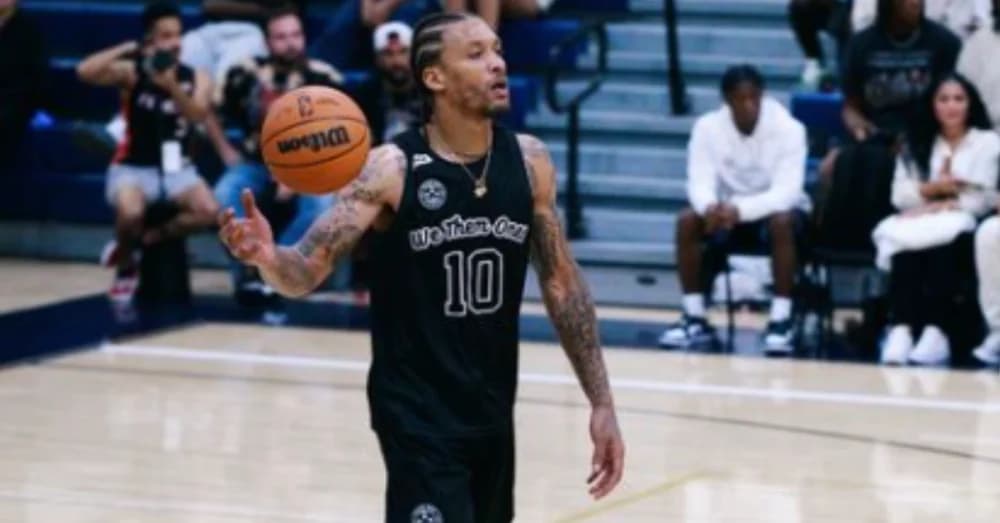Michael Beasley Reflects: Knicks Missed Playoff Opportunity with Wrong Roles

Michael Beasley, a former NBA standout and second overall pick in the 2008 Draft, recently reflected on his time with the New York Knicks and expressed regret over what he believes could have been a transformative chapter in his career. On the “Club 520 Podcast,” Michael Beasley discussed how crucial roles are in the NBA, suggesting that if he had been given a proper role with the Knicks, the team could have made a deeper playoff run.
Signed by the New York Knicks on August 8, 2017, Michael Beasley played over 74 games in that season, averaging 13.2 points per game while shooting an impressive 50.7% from the field, including 39.5% from beyond the arc. He also contributed 5.6 rebounds per game during his time in New York. However, he found himself on a team with various role players, while Kristaps Porzingis was positioned as the franchise’s cornerstone. Reflecting on that season, Beasley lamented the lack of a cohesive plan that could have capitalized on the talents available to the team.
“With Porzingis, Tim Hardaway, and Courtney Lee, I could’ve made that a playoff team,” Beasley stated during the podcast. He expressed frustration about being “out of position” and highlighted how a more effective pick-and-roll game with players like Kyle O’Quinn and Porzingis could have drastically changed the team’s fortunes. Beasley further noted that at the time, Coach Jeff Hornacek was under significant pressure, and Porzingis was still figuring out how to optimize his skill set. “I was just playing basketball, so that situation was trash, man,” Beasley concluded, reflecting on the disappointment of not being able to fully harness his abilities.
Michael Beasley says he could’ve taken the Knicks to the playoffs if they hadn’t played him out of position
“With Porzingis, Tim Hardaway, and Courtney Lee, I could’ve made that a playoff team. I was playing out of position. If they had played me at 2 guard, fronted with Jarrett… pic.twitter.com/o9jvxWTRUI— NBACentral (@TheDunkCentral) September 24, 2024
Beasley’s comments about Porzingis underscore a critical period in the young star’s career. At that time, Porzingis was still developing into the player he later became with the Washington Wizards and Boston Celtics. The challenges faced by both players on the Knicks illustrate a broader issue within the organization: the coaching staff struggled to utilize the team’s strengths effectively.
Roles are pivotal in an NBA player’s career, as not every athlete can adapt easily to whatever responsibilities are thrown their way. Michael Beasley’s belief that he could have significantly impacted the Knicks’ playoff aspirations highlights the importance of fitting players into roles that maximize their abilities. “Looking back on my time in New York, I felt confident that I could have been a huge piece in transforming the team into a playoff squad,” he reflected.

Moreover, Michael Beasley expressed a strong desire to remain with the Knicks beyond the 2017-2018 season. In a previous interview with HoopsHype, he shared, “New York hurt my feelings so badly. I really wanted to stay in New York for the rest of my career.” Unfortunately for Michael Beasley, the Knicks only offered him a veteran minimum deal. He felt that this was unfair, especially when he observed the team signing Mario Hezonja for the contract he sought. “While we were negotiating, they signed Mario Hezonja,” he noted, highlighting the disappointment he felt at being overlooked for a more lucrative offer.
The contract disagreements ultimately closed the door on Beasley’s chances of extending his stay with the franchise. Afterward, he signed with the Los Angeles Lakers for a single season before his subsequent departure from the NBA. Beasley’s reflections serve as a reminder of the delicate balance between opportunity, fit, and timing in a player’s career trajectory.
Michael Beasley’s comments highlight how crucial proper roles are in determining success in the NBA. As players strive to find their place in the league, the ability of coaches to align team strategy with player strengths becomes essential. For Beasley, the regret of what might have been lingers, underscoring the importance of role clarity in professional sports.





